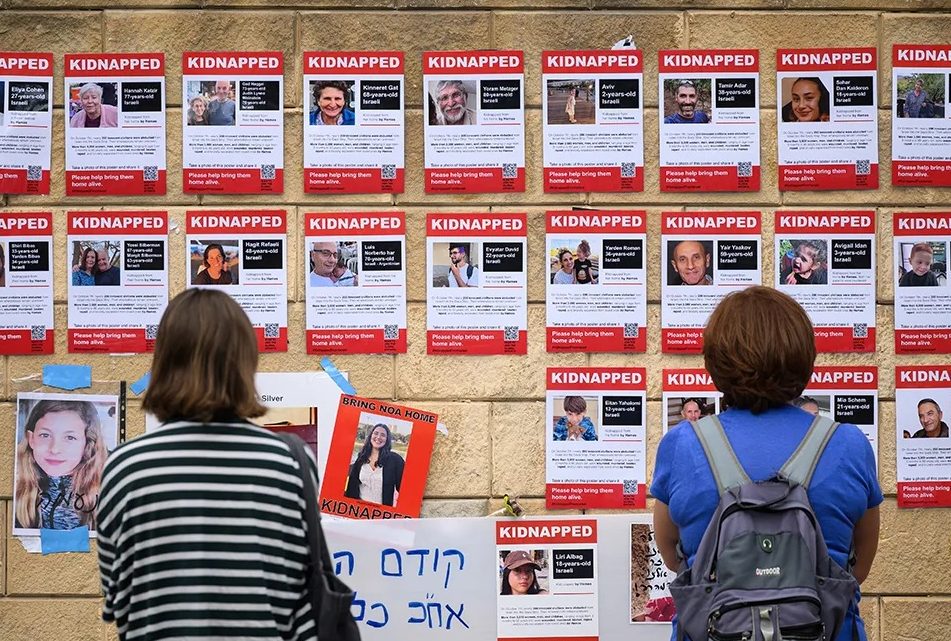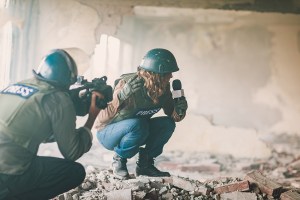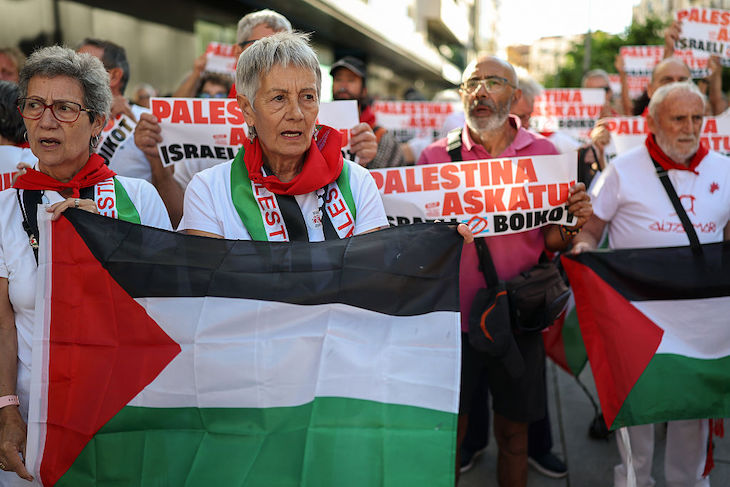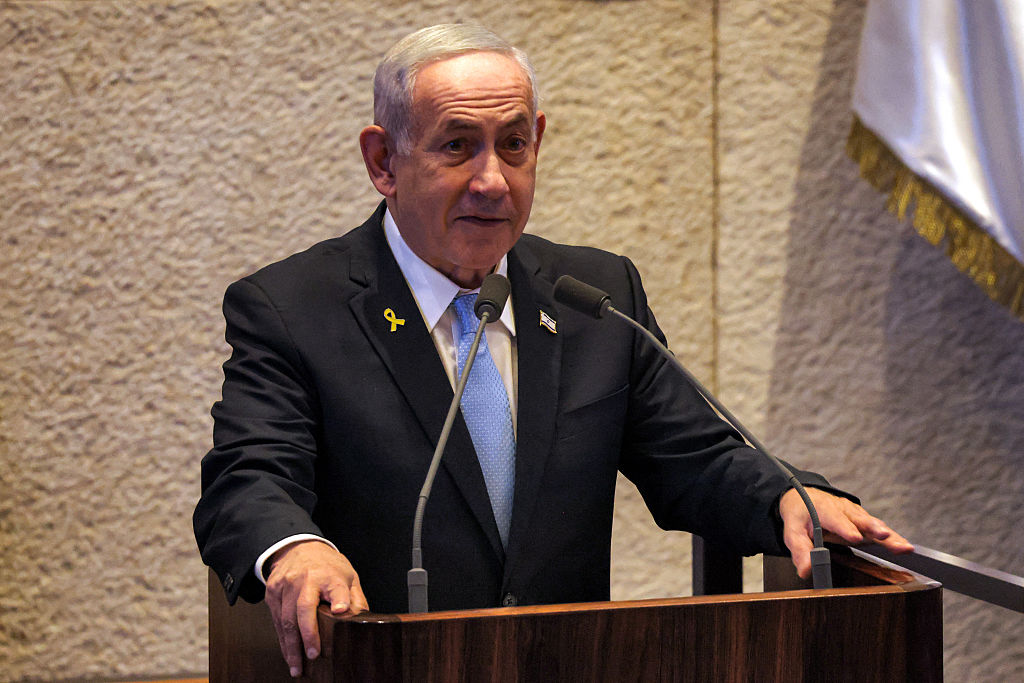The last message that Shaked Haran saw from her father was just after 7:30 a.m. on the Saturday of the Hamas attacks in Israel. Her parents were in the safe room of their house in Kibbutz Be’eri, just outside the Gaza Strip. The message said that “masked terrorists” were “swarming” everywhere. “We don’t think we’ll make it out alive.” Then nothing. When Israeli soldiers finally arrived, the house was a smoking ruin. But there was no sign of her parents, nor of her sister, her sister’s husband, their daughter aged three and son aged eight, nor of an aunt and her twelve-year-old daughter, nor of another aunt and an uncle. Ten members of the family were gone. Hours later, one of her father’s friends got through to his phone. It was answered by someone shouting in Arabic: “Hostage! Hostage! Gilad Shalit! Gaza!”
She believes this was a member of Hamas saying they had her family, just like Gilad Shalit, the Israeli soldier who was held in Gaza for five years. Haran is a lawyer in her thirties and is leading a campaign to somehow bring her relatives home. The campaign sent me a photo of the three-year-old, Yahel, who has a mop of blond ringlets. Haran says the worst thing is wondering if the two youngest children have been separated from their parents. We speak on Zoom and she’s washed out from lack of sleep. They have heard nothing from Hamas about the family. “Where are they? Are they safe? We don’t know what their situation is. We have no idea. [That] is kind of an ongoing terror attack.”
‘Where are they? Are they safe? We have no idea. [That] is kind of an ongoing terror attack’
Haran is pinning her hopes on the fact that Yahel, Naveh, the eight-year-old, and several others among the captive family have German citizenship as well as Israeli. She has even met the German chancellor to ask him to get proof of life from Hamas. Germany is among several western countries trying to free their dual nationals. Haran says that as long as things are so “chaotic” in Israel and the Israeli army is conducting its operations against Hamas then foreign governments “outside of this war” might have the best chance of bringing the hostages home.
Qatar is trying to put together an ambitious deal to free all the civilian hostages — as many as 200 — the proposal being for a brief ceasefire to allow them to leave Gaza. For the past ten days, Qatari mediators have been sitting face-to-face with Hamas officials, who have long had an office in Doha. Messages are sent back to the United States — no doubt the real author of the deal — and to Israel. Military captives are a separate issue. Hamas has said it would free those only in exchange for all the 6,000 Palestinian prisoners in Israeli jails. At the same time, there are separate discussions involving the US, Israel, Egypt, and Qatar about a humanitarian corridor to allow food, water and medical supplies into Gaza and to let the Palestinian wounded come out. Someone familiar with these clearly linked talks told me there had been “several positive steps” over the past few days: “Hamas want to de-escalate.”
That may be true, with Israeli troops massing on Gaza’s border, but speaking to Hamas officials, it is hard to be optimistic about the chances of a deal to free the hostages. Dr. Basem Naim, head of international relations for Hamas, told me it was “technically and logistically impossible” to free the civilians while Israeli bombing continued. Its military wing would not be able to collect them from the different “resistance factions” in different parts of the Gaza Strip, and — under fire — would be unable to sort the civilians from the soldiers. “We are ready to release the civilians, to deal with them in the most moral manner… when the aggression against our people is stopped.”
That sounds like a plea for a much longer ceasefire than Israel would accept. I spoke to Dr. Naim by phone. He wouldn’t tell me where he was. Hamas officials are afraid of being assassinated by Israel, whether they are inside Gaza or elsewhere in the Arab world. He asked me, stonily, why we were even talking about the Israeli hostages: “After a week of [siege] by the Israeli killing machine, no single western journalist has asked me about the Palestinians, this slaughtering of a whole people in the Gaza Strip.” He said that if the international community continued to “blindly” support Israel and to talk only about Israelis without seeing “that on the other side there are also human beings who want a dignified life” then “no one will accept to release the civilians.”
Officials like Dr. Naim maintain that Hamas ordered its fighters to take only soldiers. If civilians were now being held it was because “normal, ordinary people” had come through the broken fence, too, and had taken their own captives back to Gaza. He promised that none of the civilians, especially the women and children, would be harmed: “We have to care for them based on our moral and religious obligations, to try to protect them as much as we can.”
The hostages’ families — the ones I spoke to — don’t believe it. They don’t trust Hamas to stick to its word. “Bullshit,” said Maayan Zin, whose two daughters were taken from another kibbutz near the Gaza fence. She still looks stunned as she tells me about Ella, aged eight, and Dafna, who is fifteen, and who both “love to dance, and love to sing.” The armed men who took them live-streamed the kidnapping on Facebook and the two girls could be seen in their pajamas. Later a video was posted from Gaza showing them in what Arabic subtitles said was “modest dress suitable for prayer.” The younger girl’s hand appeared to be injured. Zin says it’s not her responsibility to give the government advice, she just asks — demands — that they “do whatever is needed to bring them back home.”
Israeli prime minister Benjamin Netanyahu met some of the hostages’ families for the first time last weekend. It was a fraught encounter, according to reports in the Israeli media. Some called on the government to delay the offensive in Gaza for negotiations to take place. The head of Israel’s National Security Council, Tzachi Hanegbi, had said earlier that Israel would not negotiate “with an enemy that we have vowed to wipe from the face of the Earth.” In response, the families accused the government of “abandoning its citizens who have been kidnapped.” Netanyahu then apparently issued a “clarification” that Hanegbi’s statement did not represent his views.
The confusion shows how difficult the hostage crisis has rendered decision-making for the Israeli government. But the invasion of Gaza will go ahead, perhaps this week, as soon as the skies clear and Israeli drones can see the battlefield. As the hostages’ families fear, and the Israeli government surely knows, the chance of a deal to free the hostages, slight as it is now, will be vanishingly small once the ground war starts.
This article was originally published in The Spectator’s UK magazine. Subscribe to the World edition here.


























Leave a Reply